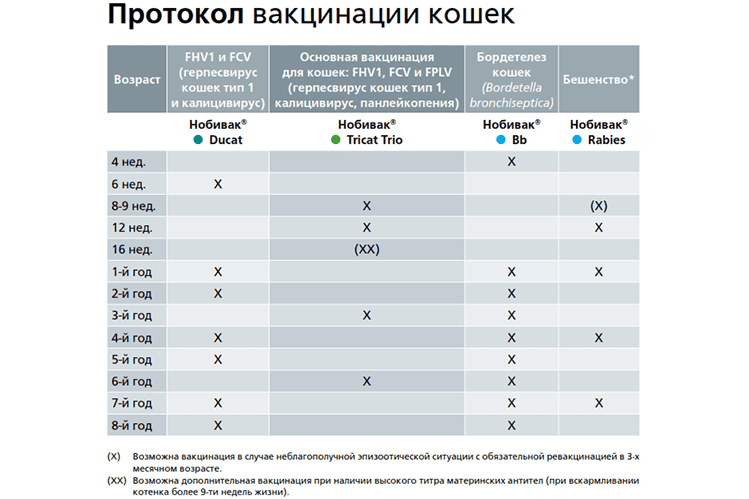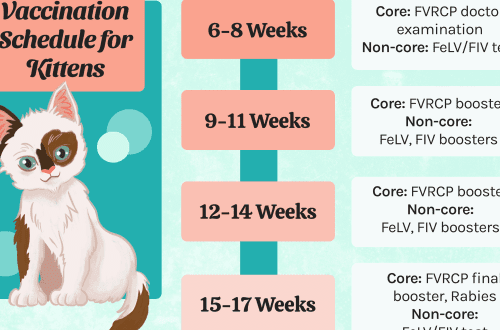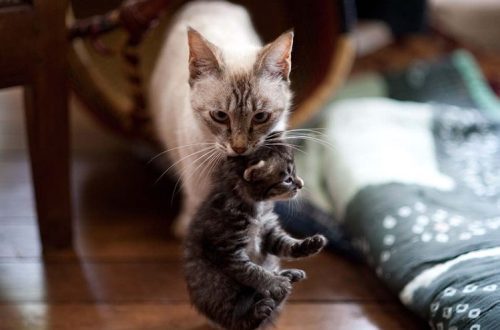
When to vaccinate a kitten?
Timely vaccination is the key to the health of your pet, a reliable way to combat infectious diseases. It is necessary to vaccinate an animal throughout its life, and the first vaccination is carried out already at the age of 1 month. We will tell you more about when exactly you need to vaccinate a kitten and from what diseases in this article.
Before proceeding to the vaccination scheme, consider the principle of its operation. Let’s find out what it is and how it works.
Vaccination allows you to introduce a weakened or killed virus / bacterium of a disease into the body. When an antigen is introduced into the body, the immune system analyzes it, remembers it, and begins to produce antibodies for destruction. This process can last from a couple of days to several weeks, after which immunity is developed to the disease. The next time the pathogen enters the body, the immune system will destroy it, preventing it from multiplying. Revaccination against major diseases is carried out annually.
This procedure is performed exclusively on clinically healthy kittens and other animals. Deworming must be done 10 days prior to vaccination. Various diseases and waste products of parasites weaken the immune system. This means that with the introduction of the vaccine, the immune system will not be able to develop antibodies in full and the vaccine will not bring results. There is also a great danger that after vaccination, due to weak immunity, the animal will get sick with the disease from which it was vaccinated.
The vaccine is usually administered subcutaneously or intramuscularly. The first vaccination of a kitten at 2-3 months is done twice with an interval of 2-3 weeks. The reason is colostral immunity obtained with mother’s milk and preventing the body from coping with the causative agent of the disease on its own. In subsequent times, the vaccine will be administered once every year.
At what age are kittens vaccinated?
Vaccinations against feline herpesvirus type 1, calcivirus, panleukopenia, bordetellosis
- Age 4 weeks – vaccination against bordetellosis (vaccine Nobivak Bb).
- Age 6 weeks – from feline herpesvirus type 1 and calcivirus (Nobivak Ducat).
- Age 8-9 weeks – the main vaccination against feline herpesvirus type 1, calicivirus, panleukopenia (Nobivak Tricat Trio).
- Age 12 weeks – revaccination Nobivak Tricat Trio.
- Age 1 year – vaccination against herpesvirus and calicivirus (Nobivak Ducat).
- Age 1 year – from cat bordetellosis (vaccine Nobivak Rabies).
Note: at the age of 16 weeks, a second main vaccination is possible if the kitten is fed by the mother for more than 9 weeks of life.
When should a kitten be vaccinated against rabies?
- Age 12 weeks – rabies vaccine (Nobivak Rabies).
- Age 1 year – rabies vaccine (Nobivak Rabies).
Note: at the age of 8-9 weeks, vaccination against rabies is possible in case of an unfavorable epizootic situation with mandatory revaccination at 3 months.
You can visually familiarize yourself with the scheme when it is necessary to vaccinate a kitten, as well as an adult cat, from the table below.

The letters in the name of the vaccine indicate the disease, the causative agent of which contains. For example:
- R – rabies;
- L — leukemia;
- R – rhinotracheitis;
- C — calicivirosis;
- P, panleukopenia;
- Ch — chlamydia;
- B – bordetellosis;
- H — hepatitis, adenovirus.
Examples of the most common vaccines include MSD (Netherlands) and MERIAL (France). They are used by veterinarians all over the world and serve as a guarantee of quality.
Approach vaccination with due responsibility. Prepare the kitten correctly and choose veterinary clinics that work with modern high-quality drugs. Do not neglect vaccinations: it is always easier to prevent a disease than to treat it. Do not forget that some diseases inevitably lead to death and are dangerous for both animals and their owners.
Timely vaccination reduces the risk of infection to a minimum, which means that the health of kittens and other pets is in our hands!
On the blog you can also read about.





